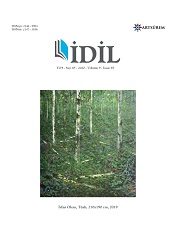Lehçede Ödünçleme ve Türleri
Borrowing and its Types in Polish
Author(s): Emrah GazneviSubject(s): Syntax, Lexis, Semantics, Comparative Linguistics, Western Slavic Languages, Philology
Published by: Sanat ve Dil Araştırmaları Enstitüsü
Keywords: Language; Polish; borrowing; interaction between languages; international words;
Summary/Abstract: Linguistic borrowing is the name given to language elements taken from a foreign language that more or less constitute the mother tongue. The most important element that sets the stage for borrowing, which means word exchange in a sense, the increasing relationship level of different cultures can be shown. This increase is undoubtedly based on technological developments, internet and films. In addition, international commercial, economic, scientific, cultural and political contacts, geographical location, historical events, wars and changes in social life are among the factors that create a favorable occasion for borrowing. Borrowed words, terms, expressions of foreign origin are available in all languages in the world. It is known that hundreds of thousands of words in the current vocabulary of Polish come from other languages. The other part consists of words from old Polish language, words derived from Slavic roots or borrowed words from the other languages. These words can penetrate into Polish in two ways: through direct contact (direct borrowings) and through another language (indirect borrowings). Borrowing can occur not only on the basis of words, but also within the framework of idioms, phrases, structures, or affixes. Some of them have entered without any change, while others have been modified and adapted to the Polish word and grammar structure. However, some of the structures in Polish modelled on foreign language today are not considered correct by some linguists. In this study, it will be examined how many types of borrowing there are, the ways in which it is realized and which structures are considered as wrong.
Journal: İdil Sanat ve Dil Dergisi
- Issue Year: 9/2020
- Issue No: 65
- Page Range: 94-105
- Page Count: 12
- Language: Turkish

